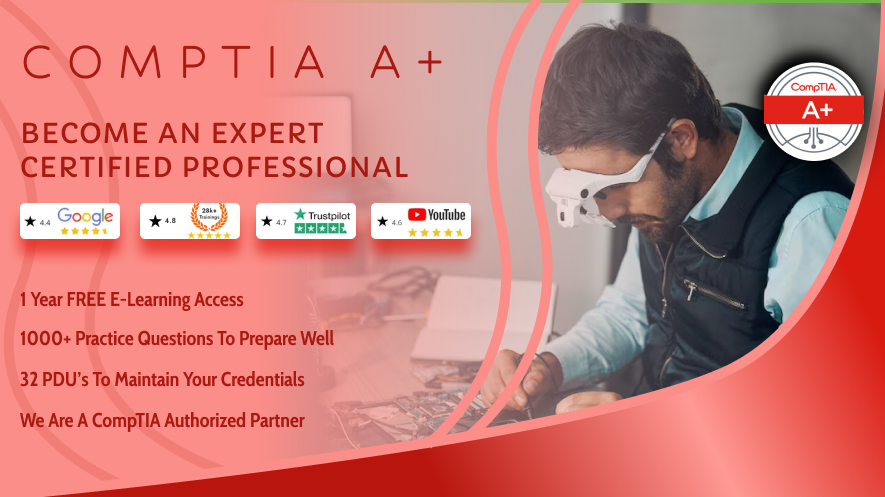The CompTIA A+ certification stands as one of the most recognized credentials in the IT industry. It serves as a foundational certification for individuals seeking a career in information technology, validating their skills in computer hardware, software, networking, and troubleshooting. Whether you're aiming to start your IT career or seeking advancement, understanding the intricacies of the CompTIA A+ exam is crucial. This guide will walk you through everything you need to know about the CompTIA A+ exam, including its importance, exam structure, preparation strategies, and career benefits.
Importance of CompTIA A+ Certification
The CompTIA A+ certification holds significant value for both aspiring and seasoned IT professionals. It serves as a benchmark for foundational IT knowledge and practical skills required in various IT roles. Here's why obtaining the CompTIA A+ certification is important:
Validation of Fundamental Skills: The CompTIA A+ certification validates your proficiency in essential IT areas such as hardware, software, networking, and security. It demonstrates to employers that you possess the knowledge and skills needed to perform entry-level IT tasks effectively.
Career Advancement: For individuals already working in IT, obtaining the CompTIA A+ certification can open doors to new career opportunities and promotions. Many employers prioritize candidates with industry-recognized certifications like CompTIA A+ when hiring for IT positions.
Industry Recognition: CompTIA A+ is globally recognized within the IT industry. Holding this certification enhances your credibility as a competent IT professional and increases your marketability to potential employers.
Overview of the CompTIA A+ Exam
The CompTIA A+ exam is designed to assess the knowledge and skills required to perform core technical tasks in IT support roles. The exam consists of two separate modules:
CompTIA A+ Core 1 (220-1001):
Covers topics such as mobile devices, networking technology, hardware, virtualization and cloud computing, and network troubleshooting.
CompTIA A+ Core 2 (220-1002):
Focuses on operating systems (Windows, Linux, macOS, iOS, Android), security, software troubleshooting, and operational procedures.
Each module comprises multiple-choice questions, drag-and-drop activities, and performance-based simulations that assess practical skills. The passing score for each module is determined by CompTIA and may vary over time.
Preparation Strategies for the CompTIA A+ Exam
Preparing for the CompTIA A+ exam requires a structured approach and dedication. Here are some strategies to help you effectively prepare for the exam:
Understand the Exam Objectives: Familiarize yourself with the exam objectives outlined by CompTIA for each module. The exam objectives provide a comprehensive overview of the topics you need to study and understand.
Use Official Study Resources: Utilize official CompTIA study materials, including textbooks, study guides, and practice exams. These resources are specifically designed to help candidates prepare for the exam and cover the content in detail.
Hands-On Practice: Hands-on experience is crucial for success in the CompTIA A+ exam. Set up a lab environment where you can practice hardware installation, troubleshooting, and operating system configurations. Practical experience reinforces theoretical knowledge and enhances your problem-solving skills.
Take Practice Exams: Take practice exams to assess your readiness and identify areas where you need improvement. Practice exams simulate the format and difficulty level of the actual CompTIA A+ exam, allowing you to gauge your performance and focus your study efforts accordingly.
Join Study Groups and Forums: Engage with fellow exam takers through study groups and online forums. Participating in discussions, sharing study tips, and seeking advice from others can enhance your understanding of complex topics and provide additional support during the exam preparation process.
Review and Revise Regularly: Allocate dedicated time to review and revise the material regularly. Repetition is key to retaining information and reinforcing concepts covered in the exam.
Benefits of Obtaining CompTIA A+ Certification
Achieving CompTIA A+ certification offers numerous benefits that can positively impact your IT career:
Enhanced Career Opportunities: CompTIA A+ certification opens doors to entry-level IT positions such as help desk technician, desktop support specialist, and IT support specialist. It serves as a foundational credential for advancing to more specialized IT roles.
Higher Earning Potential: Certified IT professionals typically command higher salaries compared to their non-certified counterparts. CompTIA A+ certification validates your skills and expertise, making you more valuable to employers.
Professional Credibility: Holding CompTIA A+ certification demonstrates your commitment to professional development and proficiency in core IT competencies. It enhances your credibility and reputation within the IT industry.
Continual Learning and Growth: The IT industry is constantly evolving, with new technologies and trends emerging regularly. Maintaining CompTIA A+ certification requires you to stay updated with the latest advancements in IT, fostering continual learning and professional growth.
Conclusion
In conclusion, the CompTIA A+ certification serves as a valuable asset for individuals pursuing a career in information technology. By understanding the importance of the certification, familiarizing yourself with the exam structure, implementing effective preparation strategies, and leveraging the benefits of certification, you can position yourself for success in the dynamic field of IT. Whether you're just starting your IT journey or looking to advance your career, CompTIA A+ certification can be the catalyst for achieving your professional goals. Prepare diligently, stay focused, and embrace the opportunities that come with earning this prestigious certification.





Comments